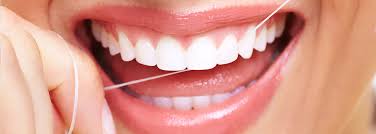Do You Really Need to Floss? We Asked a Dentist

We all know we should be flossing – but whether they actually do it is another matter. It’s often skipped, rushed, or forgotten altogether. Some claim flossing is overrated. Others say their dentist has never mentioned it. And then there are those who do it religiously, every night before bed.
So what’s the truth? Is flossing genuinely essential for your oral health, or is brushing alone enough? We asked our team of dentists at DentaQuest – and the answer is simple: yes, flossing really does matter. But it’s also not quite as straightforward as the old “you must floss every day or else” message you might have heard.
What Flossing Actually Does
To understand why flossing is important, it helps to know what brushing misses.
When you brush your teeth for the recommended two minutes – your toothbrush only reaches around 60% of the tooth’s surface. That means about 40% is left , mostly in the spaces between teeth and just under the gumline. These tight areas are where plaque loves to build up, and where your brush simply can’t reach.
Flossing helps clean out that hidden plaque and food debris, preventing it from turning into tartar (which can be removed by a dentist or hygienist). If left alone, tartar buildup increases your risk of tooth decay, gum disease and bad breath even if the rest of your mouth looks clean.
Is Any There Scientific Evidence?
Some controversy emerged a few years ago when media outlets reported there wasn’t enough scientific proof that flossing was effective. This led many people to believe flossing might be unnecessary altogether.
While long-term studies are harder to conduct for flossing than, say, medication trials, the general consensus from dental professionals remains the same: interdental cleaning (cleaning between the teeth) is an essential part of a comprehensive oral hygiene routine.
Several smaller studies have shown that flossing, when done properly, does reduce plaque and gingivitis, especially when combined with regular brushing and dental care. What matters most is consistency – and using a technique that’s right for your mouth.
Is Classic Floss the Only Option?
Here’s some good information: you don’t have to use string floss if it’s something you struggle with.
There are now a range of interdental cleaning tools available, and for many individuals, they’re far more effective and user-friendly than traditional floss.
Some of the most widespread options include:
Interdental brushes (small brushes that fit between your teeth – excellent if you have gaps)
Soft picks (rubber-tipped options that are gentle on gums)
Water flossers (devices that water to dislodge food and plaque – ideal for people with braces or dexterity issues)
Our dentists at DentaQuest often recommend interdental brushes as the first choice, particularly for adults with gum concerns or dental work. They’re easy to use, reusable, and come in different sizes to suit different spaces between teeth.
So, How Often Should You Floss?
The objective is once a day – preferably in the evening, before or after brushing. That said, something is better than nothing. If you can’t commit to daily flossing, try starting with a few times a week and build up from there. The key is consistency.
And if your gums bleed when you floss, don’t worry. It’s a common sign of inflammation from plaque buildup. Bleeding should reduce as your gums get healthier with regular cleaning. If it doesn’t stop after a couple of weeks, or if you experience persistent pain, it’s time to see your dentist or hygienist for advice.
What If You’ve Never Flossed?
If flossing has never been part of your routine, it’s not too late to start. In fact, beginning now could significantly improve your gum health over time. Just be patient with yourself – and don’t worry if it takes a while to get the hang of it.
At DentaQuest, we don’t lecture or judge. Instead, we take the time to show you practical, personalised ways to care for your teeth – including demonstrating the best flossing techniques for your specific needs. We’ll also help you find tools that feel comfortable to use, so flossing doesn’t feel like a chore.
Look for A Trusted Dentist
Brushing your teeth twice a day is the best start – but to truly protect your smile, it’s important to clean between your teeth too. Whether you use string floss, interdental brushes or a water flosser, the goal is the same: to reach the spots your toothbrush can’t.
If you’re not sure where to start, or want a bit of expert guidance, we’re here to help. Whether you’re visiting a dentist in Taunton, Weston-super-Mare or Bristol, our friendly team will happily show you how to care for your smile – no pressure, no judgement, just honest advice.



